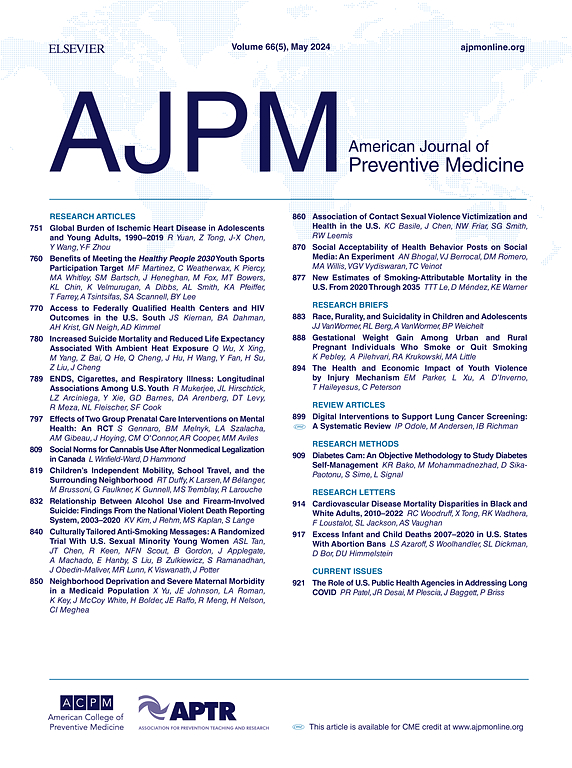Cardiometabolic Diseases and Mental Health Disorders in Korean Adults With Disabilities: A 3-Year Retrospective Analysis and Risk Comparison
IF 4.3
2区 医学
Q1 MEDICINE, GENERAL & INTERNAL
引用次数: 0
Abstract
Introduction
Evidence suggests that adults with disabilities are more prone to cardiometabolic diseases and mental health disorders. However, most studies have focused on single conditions or small-scale samples. This study aimed to investigate the risk and prevalence of multiple cardiometabolic and mental health conditions in Korean adults with disabilities and compare them with those in nondisabled adults.
Methods
This retrospective study utilized nationally representative data from the Korea Health Panel Survey, spanning the years 2019 to 2021. A total of 32,166 adults, including 2,356 adults with disabilities, were analyzed. Cardiometabolic diseases included hypertension, diabetes, and obesity; mental health disorders included stress, anxiety, depression, and suicide ideation. Multivariable-adjusted regression models were employed to determine the factors associated with and the risk of cardiometabolic diseases and mental health disorders in adults with disabilities.
Results
The overall prevalence of hypertension, diabetes, obesity, stress, depression, anxiety, and suicide ideation was 51.7%, 27.2%, 33.9%, 26.6%, 12.0%, 8.9%, and 8.7%, respectively. Adults with disabilities exhibited an increased risk of hypertension (OR=1.24), diabetes (OR=1.52), obesity (OR=1.25), stress (OR=1.21), depression (OR=1.75), anxiety (OR=1.91), and suicide ideation (OR=1.73) compared with nondisabled adults. Being female, increased age, unemployment, overweight/obesity, urban residency, physical inactivity, and alcohol intake were significant factors associated with the risk of cardiometabolic diseases and mental health disorders.
Conclusions
Adults with disabilities exhibit a higher prevalence and increased risk of cardiometabolic diseases and mental health disorders. Sex-specific interventions, including personalized nutrition, lifestyle plans, and tailored mental health services, are essential to mitigate these risks in this vulnerable population.
韩国成年残疾人心脏代谢疾病和精神健康障碍:3年回顾性分析和风险比较
有证据表明,成年残疾人更容易患心脏代谢疾病(CMD)和精神健康障碍(MHD)。然而,大多数研究都集中在单一条件或小规模样本上。本研究旨在调查韩国成人残疾中多种心脏代谢和精神健康状况的风险和患病率,并将其与非残疾成年人进行比较。方法:本回顾性研究利用了韩国健康小组调查(KHPS)中具有全国代表性的数据,时间跨度为2019年至2021年。共分析了32166名成年人,其中包括2356名残疾成年人。CMD包括高血压、糖尿病和肥胖;MHD包括压力、焦虑、抑郁和自杀意念。采用多变量调整回归模型确定残疾成人CMD和MHD的相关因素和风险。结果:高血压、糖尿病、肥胖、应激、抑郁、焦虑和自杀意念的总患病率分别为51.7%、27.2%、33.9%、26.6%、12.0%、8.9%和8.7%。与非残疾成年人相比,残疾成年人患高血压(OR: 1.24)、糖尿病(OR: 1.52)、肥胖(OR: 1.25)、压力(OR: 1.21)、抑郁(OR: 1.75)、焦虑(OR: 1.91)和自杀意念(OR: 1.73)的风险增加。女性、年龄增长、失业、超重/肥胖、城市居住、缺乏身体活动和饮酒是与CMD和MHD风险相关的重要因素。结论:成年残疾人的CMD和MHD患病率更高,风险也更高。针对性别的干预措施,包括个性化营养、生活方式计划和量身定制的精神卫生服务,对于减轻这一弱势群体的这些风险至关重要。
本文章由计算机程序翻译,如有差异,请以英文原文为准。
求助全文
约1分钟内获得全文
求助全文
来源期刊

American Journal of Preventive Medicine
医学-公共卫生、环境卫生与职业卫生
CiteScore
8.60
自引率
1.80%
发文量
395
审稿时长
32 days
期刊介绍:
The American Journal of Preventive Medicine is the official journal of the American College of Preventive Medicine and the Association for Prevention Teaching and Research. It publishes articles in the areas of prevention research, teaching, practice and policy. Original research is published on interventions aimed at the prevention of chronic and acute disease and the promotion of individual and community health.
Of particular emphasis are papers that address the primary and secondary prevention of important clinical, behavioral and public health issues such as injury and violence, infectious disease, women''s health, smoking, sedentary behaviors and physical activity, nutrition, diabetes, obesity, and substance use disorders. Papers also address educational initiatives aimed at improving the ability of health professionals to provide effective clinical prevention and public health services. Papers on health services research pertinent to prevention and public health are also published. The journal also publishes official policy statements from the two co-sponsoring organizations, review articles, media reviews, and editorials. Finally, the journal periodically publishes supplements and special theme issues devoted to areas of current interest to the prevention community.
 求助内容:
求助内容: 应助结果提醒方式:
应助结果提醒方式:


